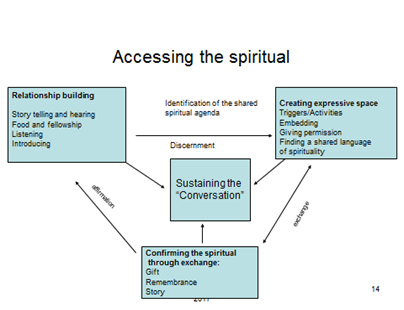A significant amount has been written about the importance and value of spirituality and spiritual care. Interpretations vary but there are always the underlying themes of ‘meaning and relationship’ whether derived from a faith or in a secular way. Understanding our spiritual needs is one of the ways in which we build our identity, sense of belonging and resilience to life circumstances.

The following extracts from various articles highlight different approaches and perspectives and are food for thought in relation to the different environments in which we work. The more you understand about what matters to you the more you are likely to empathise with someone for whom you are caring.
Defining spirituality is always tricky. In this context, we mean the search for that which gives zest, energy, meaning and identity to the person’s life, in relation to other people and the wider world.
(Froggatt K and Moffitt L (1997) Spiritual needs and religious practice in dementia care. State of the Art in Dementia Care, London: Centre for Policy on Ageing (Ed. M. Marshall))
The concept of spirituality is difficult to understand although there is an increasing acknowledgement that it plays an important part in our lives. There are two approaches to the definition of spirituality; both acknowledge a search for meaning. For some people, a divine presence is central; for others spirituality is a secular concept involving inner life and personal belief.
Five ways of thinking about spirituality are:
- part of a religious belief
- a secular concept
- a metaphor for absence
- a search for meaning with or without God
- the deepest values and meanings by which people seek to live
For a fuller explanation please go to the publication ‘Insights’ – spirituality and ageing: implications for the care and support of older people published by IRISS, written by Dr Harriet Mowat and Maureen O’Neill.
Spirituality should certainly not be restricted to a narrowly Christian version. I would want to maintain that every person is a spiritual person, whether or not they recognise it. However, a more precise definition is helpful. I would see ‘the spiritual’ as including those intangibles in life which are nevertheless of great significance to us. Such would incorporate principles and beliefs, values, aesthetic and a sense of awe. In particular finding meaning and purpose in life would seem to be very important; meaning being primarily retrospective, purpose being prospective (Jewell 2010). For some their spirituality will include belief in a god or a divine force, for others not.
Jewell A ‘Spirituality and personhood in dementia’ (2011) Jessica Kingsley
The report with Health in Mind (Scottish Executive 2002) emphasises the importance of being able to reflect on and understand life events, which is enhanced by the ‘personal capacity and resilience that a spiritual life frequently provides’.
The ‘Equal Minds’ report (Scottish Government 2005) states that:
mental health is the emotional and spiritual resilience which allows us to enjoy life and to survive pain, disappointment and sadness’ and cites as one of the protective factors for individuals ‘being spiritual with access to faith groups.

Harriet Mowat: ‘Voicing the Spiritual’ in Spirituality and Personhood in Dementia (2011) Jessica Kingsley.
The fruit of the spirit (Galatians 5)
A focus on “love, joy, peace, patience, kindness, goodness, gentleness, faithfulness and self- control accompanied by the 3 ‘Rs’ of spiritual care – Reflection, relationship and restoration” is a way of assessing spiritual needs and how they are met (Margaret Goodall: ‘Chaplaincy as a model of Spiritual Care’ in Spirituality and Personhood in Dementia’ (2011) Jessica Kingsley
Harold Koenig described 14 spiritual needs of older people and although couched more obviously in religious terms is also relevant in a non-religious context:
- Need for support in dealing with loss
- Need to be thankful
- Need to transcend circumstances
- Need to prepare for death and dying
- Need to be forgiven and to forgive
- Need for continuity
- Need to find meaning, purpose and hope
- Need for validation and support of religious behaviours
- Need to love and serve others
- Need to engage in religious behaviours
- Need for unconditional love
- Need for personal dignity and sense of worthiness
- Need to feel that God is on your side
- Need to express anger and doubt
(1994) Ageing and God: spiritual pathways to mental health in midlife and later years (New York: The Haworth Pastoral Press)

